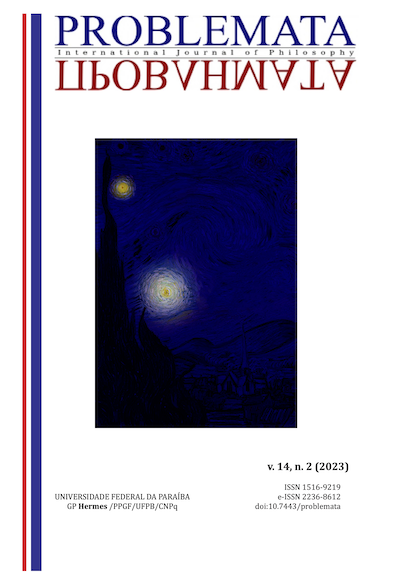THAT OTHER BOTHERING:
THE BURDEN OF MODERN ANTHROPOS
DOI:
https://doi.org/10.7443/problemata.v14i2.66624Keywords:
Countercolonial, Ethnocide, Humanity, Modernity, MemoryAbstract
This article problematizes the notion of anthropos formed in modernity as a universal model of humanity. Thus, the main question is how the consolidation of this universal happens by denying the existential and cultural constitutions of the Other. One of these denials is directed to the ancestral memory, so much so that at first we treat this denial as the foundation of the modern project in order to exterminate the potentialities of other ways of sharing the experience in the world. Based on this scenario, we seek to elucidate the strategies of domination of colonial discourse by the "colonial action of extermination of memory" in a dialogue with bell hooks (2017) and Saidiya Hartman (2021). Then, the analysis of these strategies focuses on colonial violence that instrumentalizes the "mouth" (KILOMBA, 2019) to silence colonized people and position them as subalternized subjectivities. But we also propose the vitalization of memory by making use of the concept of "transfluency" of Antônio Bispo dos Santos (2019) in conjunction with the "opacity" of Edouard Glissant (2021). This articulation aims to overcome this action of hegemonic domination that imposes on the Other the payment of his ancestral memory. Finally, we understand that this vitalization produces resistance to the machinery of colonial destruction, establishing an opportunity to generate knowledge outside the hieralist and dominant terminologies of anthropos.
Downloads
References
CÉSAIRE, Aimé. Discurso Sobre o Colonialismo. São Paulo: Veneta, 2020.
CHAKRABARTY, Dipesh. Provincializing Europe: postcolonial thought and historical difference. Princenton: Princeton University Press, 2000.
CLASTRES, Pierre. Arqueologia da Violência: Pesquisas de Antropologia Política. São Paulo: Editora Cosac &Naify, 2004.
DUSSEL, Enrique. Europa, Modernidade e Eurocentrismo. In: LANDER, Edgardo (Org.). Colonialidade do poder: Eurocentrismo e Ciências Sociais. Buenos Aires: CLACSO, 2005, p. 25-34.
FANON, Frantz. Pele Negra, Máscaras Brancas. Salvador: EDUFBA, 2008.
FOUCAULT, Michel. O que são as luzes? In: FOUCAULT, Michel. Ditos e escritos II – arqueologia das ciências e história dos sistemas de pensamento. Rio de Janeiro: Forense Universitária, 2000, p. 335-351.
GLISSANT, Édouard. Poética da Relação. Rio de Janeiro: Bazar do Tempo, 2021.
HARTMAN, Saidiya. Perder a Mãe: Uma jornada pela rota atlântica da escravidão. Rio de Janeiro: Bazar do tempo, 2021.
HOOKS, bell. Ensinando a Transgredir: A educação como prática da liberdade. – 2. ed- São Paulo: Editora WMF Martins Fontes, 2017.
HOOKS, bell. Erguer a Voz: Pensar como feminista, pensar como negra. São Paulo: Editora Elefante, 2019.
HUGO, Victor. 31èmeanniversaire de l´abolition de l´esclavage. Paris :Brière, 1879.
KANT, Immanuel. Ideia de Uma História Universal Com Um Propósito Cosmopolita. Lusosofia. Disponível em: http://www.lusosofia.net/. Acesso em 23 maio 2022.
KILOMBA, Grada. Memórias da Plantação: Episódios do racismo cotidiano. Rio de Janeiro: Cabogó, 2019.
PATTERSON, Orlando. Escravidão e Morte Social: Um estudo comparativo. São Paulo: EDUSP, 2008.
QUIJANO, Aníbal. Colonialidade do Poder, Eurocentrismo e América Latina. In: LANDER,Edgardo (Org.). Colonialidade do poder: Eurocentrismo e Ciências Sociais. Buenos Aires: CLACSO, 2005, p. 117-142.
RAMOSE, Mogobe B. Una perspectiva africana sobre la justicia y la raza. Polylog, 2001. Disponível em: https://them.polylog.org/3/frm-es.htm. Acesso em: 24 jun. 2022.
SANTOS, Antônio Bispo dos. As fronteiras entre o saber orgânico e o saber sintético. In A. R. Oliva, M. N. Chaves, R. C. G. Filice; W. F. Nascimento (Orgs.), Tecendo Redes Antirracistas. Áfricas, Brasis, Portugal. Belo Horizonte: Autêntica, 2019.
SANTOS, Antônio Bispo dos. Colonização, Quilombos, Modos e Significações. Brasília: INCTI/UnB, 2015.
WILDERSON III, Frank. Afropessimismo. São Paulo: Todavia, 2020.
Downloads
Published
Issue
Section
License
Copyright (c) 2023 Luis Thiago Freire Dantas, Igor Lorra da Costa Pereira

This work is licensed under a Creative Commons Attribution 4.0 International License.
Authors who publish with this journal agree to the following terms:
- Authors retain copyright and grant the journal right of first publication with the work simultaneously licensed under a Creative Commons Attribution License that allows others to share the work with an acknowledgement of the work's authorship and initial publication in this journal.
- Authors are able to enter into separate, additional contractual arrangements for the non-exclusive distribution of the journal's published version of the work (e.g., post it to an institutional repository or publish it in a book), with an acknowledgement of its initial publication in this journal.
-
- Authors are permitted and encouraged to post their work online (e.g., in institutional repositories or on their website) prior to and during the submission process, as it can lead to productive exchanges, as well as earlier and greater citation of published work (See The Effect of Open Access).





